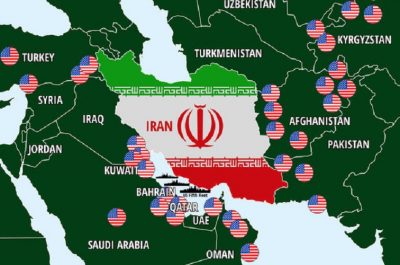Refocus on Iran’s Behaviour

All Global Research articles can be read in 51 languages by activating the “Translate Website” drop down menu on the top banner of our home page (Desktop version).
To receive Global Research’s Daily Newsletter (selected articles), click here.
Visit and follow us on Instagram at @crg_globalresearch.
***
Once again, gallons of ink are being spilled on articles arguing for and against US efforts to secure a new nuclear weapons pact with Iran. Will Iran return to the talks? Will the US agree to Iranian terms (and vice versa)? And at this point, do the Iranians even want a deal?
While at times interesting, the entire discussion is focused on an issue that I feel is a dangerous diversion. Similar to my thoughts during the negotiations that led to the JCPOA, I find myself asking again why we are expending so much political capital, imposing so many sanctions and involving so many important countries to address a problem that doesn’t exist, while doing nothing to address real problems plaguing the region.
The simple fact is that Iran doesn’t have a nuclear bomb and, as difficult as it may be for some to accept, even if it did have one, it could never use it. Meanwhile, the real problem posed by Iran is the meddlesome role it’s playing across the region. Let’s look more closely at both of these matters.
First, Iran has no bomb and even if it did it could not use it for two reasons. In the age of “mutually assured destruction”, Iran’s use of a nuclear warhead would result in its becoming a radioactive parking lot within minutes. Even if it were not flattened by a counterattack, its use of such a horrible weapon would ensure not only worldwide condemnation, but also repercussions that would mark the end of the Islamic Republic. Further, Iran could never use a nuclear bomb because of the consequences of the explosion’s fallout. If it bombed Israel, radioactivity (depending on the direction the wind was blowing) would also take countless Palestinian, Jordanian, and Lebanese lives and possibly many others as well. And if Iran were to use a nuclear bomb across the Gulf, the impact would devastate the entire region, including Iran itself.
For these same reasons, Israel, despite reportedly possessing hundreds of nuclear warheads, has never used them in any of its many wars with its Arab neighbours, nor can it use them in the future. The same is true for India, Pakistan, and North Korea.
Given this, the only apparent reason for possessing such a weapon is the bragging rights. In reality, our obsessive preoccupation with Iran’s “programme” is giving it more attention and bragging rights than Iran would ever get from actually having a bomb it couldn’t use. Iran sits centre stage with all of the world’s powers meeting with and cajoling its leaders. It’s exactly the type of attention “bad boys” crave and we’re giving it to them, while not paying attention to the really dangerous things Iran is doing across the region.
Ironically, it was Israel who pushed the Iranian “nuclear threat” to the front burner. When the Obama administration took the bait and negotiated the “nuclear deal”, Israel then led the charge against the deal. There are two reasons for this: First, Israel and Iran need each other as foils. Second, their intended audience is the Arab World that lies between them.
When Israel was bombing Lebanon, Iran was able to play to the Arab masses saying: “Look at what Israel’s doing and only our ally, Hizbollah, is standing against them and the US.” As a result, a little more than a decade ago, Iran and Hizbollah had extraordinarily high favorable ratings in most Arab countries. But during the past decade, as Iran’s machinations in Lebanon, Syria, Iraq, and Yemen have become increasingly clear, Iran’s ratings plummeted across the region and some Arabs came to see Israel as a possible source of support against the Islamic Republic’s meddlesome behaviours.
It was for this reason that I could never understand why so much effort was expended on stopping Iran’s nuclear programme while ignoring its dangerous and unsettling regional role. These are exactly the issues we should be addressing.
At this point, the P5+1 nations and their negotiators should focus on ways of assisting Iraqis and Lebanese in building non-sectarian governments that can rein in Iranian-backed militias, bringing them under the control of their respective governments. Our polling in both countries makes clear that strong majorities support this. There should also be a concerted effort in Yemen to stop the Houthi assault on Ma’rib and press for negotiations that can bring an end to that horrible conflict.
At home, Iran has problems on all sides that must be addressed, facing unrest with their substantial Azeri population in the north and their Arab citizens in the Ahwaz region. Iran also faces the renewed threat from the unsettling situation resulting from the Taliban victory in Afghanistan. And, if that were not enough, young Iranians in major cities continue to demand more jobs and personal freedoms.
These are the issues that need to be on the table. Rather than focusing on a bomb that doesn’t exist, we should direct diplomacy and apply economic pressure on efforts to make Iran see the benefits of becoming responsible citizens in the Gulf and Arab East by reining in their meddlesome behaviours and putting their own people’s needs first. Such an effort might not yield immediate results or even work at all. But it would at least be focused on the right issues.
*
Note to readers: Please click the share buttons above or below. Follow us on Instagram, @crg_globalresearch. Forward this article to your email lists. Crosspost on your blog site, internet forums. etc.
The writer is president of the Washington-based Arab American Institute.
Featured image is from American Herald Tribune

